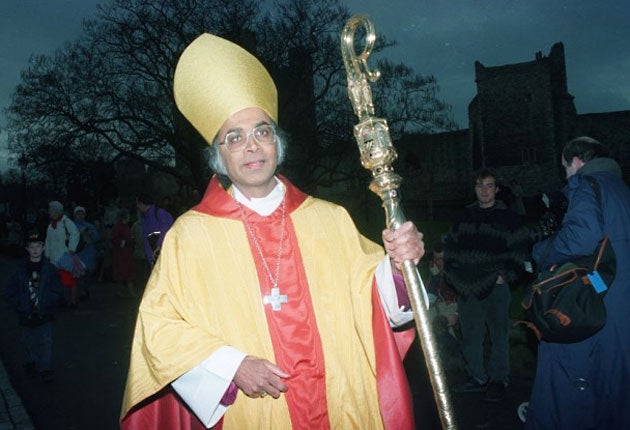What did the aide say about the Bishop ...?

His outspoken views on gay rights and the integration of Muslim communities have attracted vitriolic criticism and even earned him death threats from outside the Church of England.
Now the controversial Bishop of Rochester, the Rt Rev Michael Nazir-Ali, 59, has found himself the target of a scatological attack by an aide in the offices of the Archbishop of Canterbury, Dr Rowan Williams.
A confidential document sent from Lambeth Palace to No 10 Downing Street and the Church of England's 43 diocesan bishops included the unclerical word "arsehole" appended to the name of Dr Nazir-Ali, Britain's most senior Asian Anglican.
The rogue insult – which specifically referred to "The arsehole Bishop of Rochester" – appeared in a confidential list of job vacancies and prospective candidates which was drawn up by the clergy appointments adviser, the Rev John Lee. The offending member of Dr Williams's staff has since been sacked.
The Church of England hopes its decision to sack the author of the abuse will end an embarrassing episode for the Lambeth Palace hierarchy. Mr Lee has already sent a written apology to the Bishop of Rochester.
In the letter, Mr Lee admitted that the original version of the document had "contained a very offensive remark that was inserted by a person or persons (as yet) unknown and for which we extend our deepest and most sincere apologies".
The perpetrator eventually admitted the smear and was summarily dismissed. The Church yesterday refused to name the culprit, saying only that he or she no longer works for any of the Church of England's national institutions.
A spokesman said: "When this came to light there was an immediate investigation. The person responsible admitted to it and was summarily dismissed."
Church speculation about the incident has been rife for weeks as Anglican insiders argue over which of Dr Nazir-Ali's recent remarks might have provoked such hateful abuse from a Lambeth Palace official. The bishop's principled stand against gay bishops is thought by church insiders to have prompted the attack.
Dr Nazir-Ali has courted contention since his appointment as England's first Asian diocesan bishop in 1994. In January this year he was given police protection after calling for an end to "no-go areas" for non-Muslims in Britain. He received death threats and was accused of racism and whipping up hatred against Muslims.
In July he noisily boycotted the Lambeth Conference, the Anglican Communion summit, in protest at the presence of pro-gay bishops – thus bringing further opprobrium, this time from the liberal wing of the Anglican Church.
However, the bishop also has his supporters. He received a standing ovation before even uttering a single word of his keynote speech delivered to the conservative-leaning Global Anglican Future Conference in Jerusalem this year.
His views on multicultural Britain have also won the approval of the chair of the Equality and Human Rights Commission, Trevor Phillips.
Michael Nazir-Ali was born in Karachi to Christian parents and holds joint British and Pakistani nationality. He was ordained in 1976, and in 1984 became the youngest bishop in the Anglican communion. He is noted for championing traditional biblical teaching, lamenting the demise of Christianity in society and painting Islam as a threat to the British way of life.
After being passed over for the position of Archbishop of Canterbury in 2002 he has become increasingly outspoken while at the same time his stature has grown among Anglo-Catholics and evangelicals.
This latest incident, written abuse directed at one of the Church's most outspoken opponents of gay rights, is seen by many as only serving to deepen the divisions on the issue within the Anglican Communion.
Bishop of Rochester In his own words
*On immigration (2008):
"There has been a worldwide resurgence of the ideology of Islamic extremism. One of the results of this has been to further alienate the young from the nation in which they were growing up and also to turn already separate communities into "no-go" areas. Those of a different faith or race may find it difficult to live or work there because of hostility to them. In many ways, this is the other side of the coin to far-right intimidation."
*On family life (2000):
"It is very important for the Church to continue saying that having children and their nurture is a basic good of marriage and not an optional extra. Just as a marriage is not complete without mutual support, companionship and love, so there is a real lack if the intention is never to have children, regardelss of circumstances. This signals that marriage is not a matter of self-indulgence. In our age, such teaching is crucial."
*On the economy:
"People are anxious. They are anxious about their jobs and whether they will be able to keep a roof over their heads. They worry about their savings and their pensions. Some of the answer lies in looking beyond the current financial crisis to consider what sort of society we would like to see emerging from the hard times ahead. We need a new vision for our life together. Those who have been busily dissolving the spiritual and moral glue that has held British society together for centuries admit that they have put nothing else in its place."
Join our commenting forum
Join thought-provoking conversations, follow other Independent readers and see their replies
Comments
Bookmark popover
Removed from bookmarks